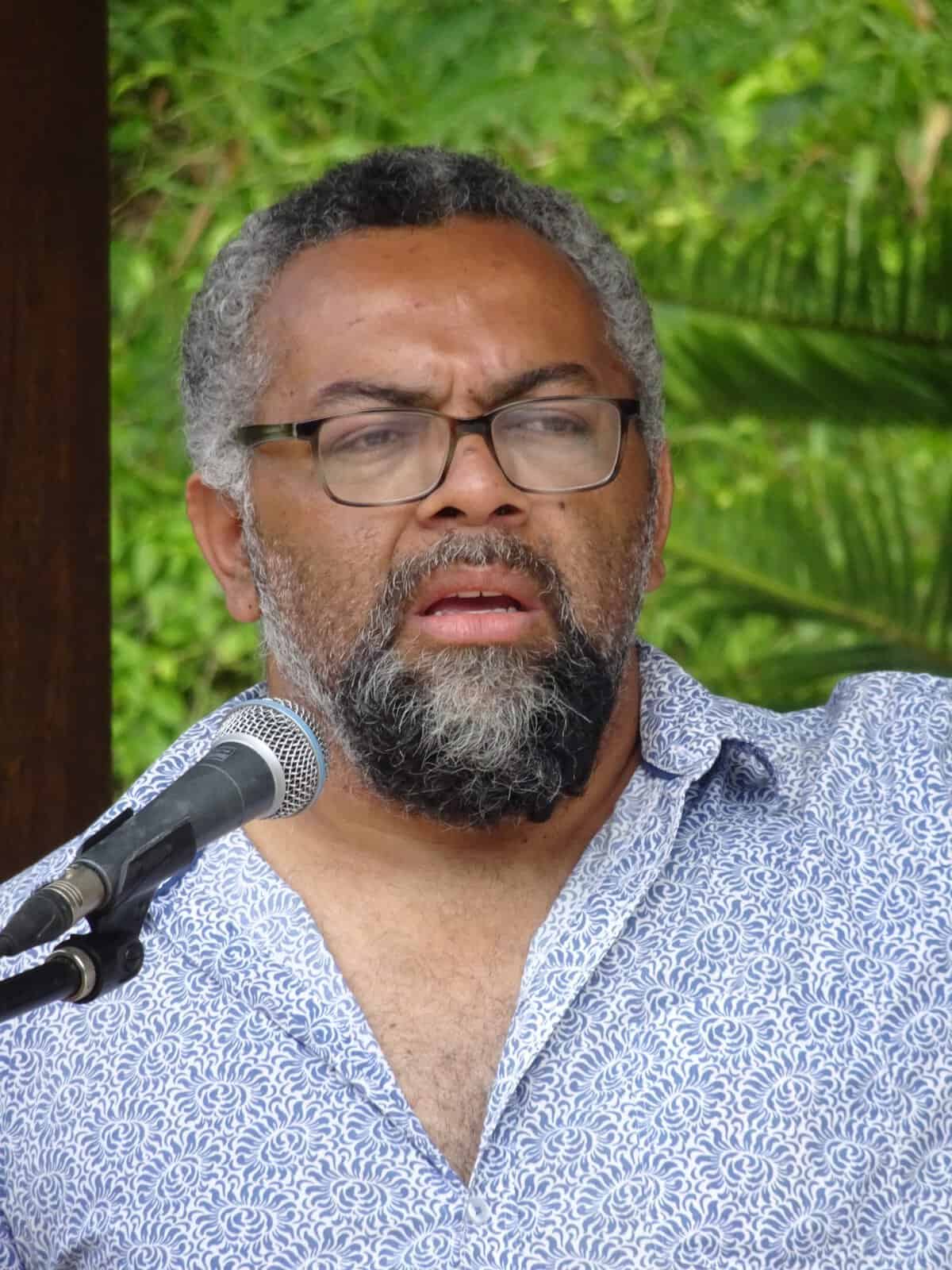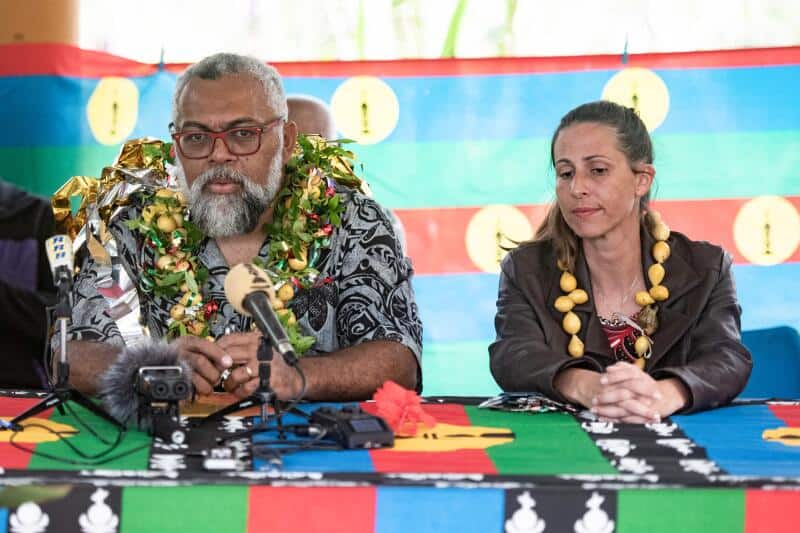In New Caledonia, Emmanuel Tjibaou has won a seat in the French National Assembly – the first time in 38 years that a pro-independence Kanak leader will serve in the French legislature in Paris.
Emmanuel is the son of the late Jean-Marie Tjibaou, the charismatic founder of the independence coalition Front de Libération Nationale Kanak et Socialiste (FLNKS), who was assassinated in 1989.
New Caledonia’s other National Assembly seat was won by Nicolas Metzdorf of the Loyalists-Rassemblement bloc, who was re-elected as a deputy after serving in the French parliament between 2022-24.
Tjibaou’s electoral victory highlights the mobilisation of a new generation in New Caledonia. He is a cultural worker, not a politician, a former director of the Jean-Marie Tjibaou Cultural Centre in Noumea, currently working as cultural director in the Northern Province. He ran for the seat backed by his alternate Amandine Darras, a leading environmentalist and New Caledonian of Caldoche heritage.
Their campaign drew extensive support from young people, even those who have been on the barricades during the last two months of rioting and clashes between police and protestors.
His final Tik Tok to voters resonated with a quiet but determined message. Sitting in a Kanak case [traditional house], Tjibaou said: “Thanks to the young people of our nation who mobilised for the first round – sitting here in the case, we’re following the path that our elders have laid out. We’re waiting for you for the second round of the legislative elections… I’m waiting for you – everyone to the polls!”
It worked. Over the two constituencies, the independence movement polled 9366 more votes than the anti-independence forces – a major blow to the Loyalist bloc, and also to French government policy in the Pacific.
Overcoming the gerrymander
The last Kanak independence leader represented in the French National Assembly was the late Rock Pidjot, a historic figure for the Kanak people who served in Paris between 1978 and 1986.
That year, the French government changed the electoral boundaries for the two New Caledonian seats, to block the Front de Liberation Nationale Kanak et Socialiste (FLNKS), the independence coalition founded in September 1984 by Jean-Marie Tjibaou. The first constituency grouped the outlying Loyalty Islands with the capital Noumea – a mixture that ensured the anti-independence parties would always hold the seat, given the large non-Kanak population in the city. The second constituency includes the major towns of the Southern Province outside the capital, as well as the rural north.
From 1986 until today, the independence movement never won a seat in the National Assembly. Last September, however, there was a breakthrough: veteran Kanak politician Robert Xowie beat Loyalist leader Sonia Backès in the race for a seat in the French Senate – an unprecedented victory for the FLNKS. With Tjibaou entering the lower house, both men have a tribune to carry the voice of indigenous Kanak and other independence supporters to the French government.
Aged just 47, Emmanuel Tjibaou ran for the election as a candidate for the “Independence and Nationalists” alliance (as reported by Islands Business, the postponement of the FLNKS Congress last month meant that there could be no joint candidates for the four-party coalition). But despite longstanding debates between pro-independence parties – inside and outside the FLNKS – all major forces united to back Tjibaou in the north, and Omayra Naisseline in the first constituency.
Facing 12 candidates in the first round of voting on 30 June, Tjibaou won 44 per cent of the vote, leading to his run-off on 7 July with Alcide Ponga, president of the anti-independence Rassemblement-LR party. On provisional results – with the French High Commission still to confirm final numbers – Tjibaou won 57.01 per cent of the poll for the second constituency, defeating Ponga with 42.99 per cent.

In a number of rural towns in the Southern Province, Ponga held the lead ( for example Boulouparis 69 / 31 or La Foa 57 / 43). But a final push to mobilise young voters and independence supporters who abstained in the first round saw massive totals for Tjibaou against Ponga in FLNKS strongholds (Thio, 92.3 / 7.7; Pouebo, 98.4 / 1.6; Poum, 89.4 / 10.6). Ponga is mayor of the municipality of Kouaoua, but he won just 15% there, against 85 per cent for Tjibaou.
Born in the tribe of Tiendanite, in the hills north of Hienghène, Tjibaou has deep roots in Kanak culture and custom. With the death of his father and uncles during the armed clashes of the 1980s, he has long grappled with the importance of reconciliation and community harmony.
On the 30th anniversary of his father’s death in 2019, I travelled to Tiendanite and we talked of independence, of custom, of memory and reconciliation after conflict. He told me that remembering his father and others killed during les évènements – the violence that wracked New Caledonia in the 1980s – was a vital part of looking to the future.
“The importance of this day is to commemorate their fight, to celebrate their life, but also to reflect on the reasons that we honour such men,” he said. “Their political vision has led us to where we are today. To commemorate them through custom, through prayer, is our way of making them live again, their words, their commitment.”
Noumea and the islands
In the poll for New Caledonia’s first constituency, Nicolas Metzdorf mobilised conservative voters in Noumea, while the Independence and Nationalists candidate Omayra Naisseline won strong support in the Kanak-majority Loyalty Islands. The final provisional results saw Metzdorf with 52.41% and Naisseline with 47.59% – a Loyalist victory but not the overwhelming vote that anti-independence politicians were seeking.
As with Tjibaou, Naisseline is from a younger generation and bears a name with mana in Kanak custom. Mare’s chieftainship was held for many years by the late high chief Nidoish Naisseline, founder of the Foulards Rouges and a powerful figure in Kanak politics and culture over many decades. In Sunday’s vote on her home island of Maré, she won 99.16% support.
In contrast, Metzdorf is a New Caledonian of European heritage, born and bred in the rural farming communities of the west coast of the main island. Founding the party Générations NC, he has a penchant for cowboy hats and stockwhips and had a strong base in the rural Caldoche community. Ambitious for office, he took his small party into the Loyalist alliance led by Southern Province President Sonia Backes. Both are fervent opponents of independence.
With Loyalist backing, Metzdorf won the second constituency in the north during the 2022 National Assembly elections. This year, however, he switched from the second to the first constituency, to run against fellow deputy Philippe Dunoyer of the Calédonie ensemble (CE) party.
Both were allies of French President Emmanuel Macron in 2022-24 and both are opposed to independence. But CE and the Loyalists are at war in local politics, and Metzdorf successfully defeated Dunoyer in the first round. Before the poll, he told Les Nouvelles: “We were in the same group in the National Assembly, but have always adopted very different political lines. I consider that Calédonie ensemble’s line is one of appeasement – they’re people who give in to violence, hatred and terror.”
Such division in the anti-independence movement complicates future talks on a new political status. It seems they know what they are opposed to – independence for New Caledonia – but have no common agenda on the future. They also have no answer to a demographic reality: most Kanak, Wallisians and Caldoche aren’t going anywhere, but many French nationals may soon pack their bags, worn down by uncertainty during the political referendums in 2018-21, followed by the COVID pandemic, a financial crisis in the crucial nickel industry, and two months of rioting and protests since 13 May.
Protests unresolved
Even with non-compulsory voting open to all French nationals, there was a high turnout in New Caledonia for these elections, highlighting the high stakes for both supporters and opponents of independence.
Since 13 May, the islands have been wracked by riots and clashes between protestors and police, causing major job losses, a collapse of business confidence and damage to houses, public building and transport (hundred of cars have been torched or overturned to use on roadblocks, and communities in the Southern Province like Mont Dore are still cut off from the capital).
The arrest of key Kanak leaders of the CCAT movement this month sparked new protests, especially after seven were transferred to prisons in France for pre-trial detention. While two women – Frederique Muliava and Brenda Wanabo – have been released from jail into community detention (wearing electronic ankle bracelets), the other detainees remain scattered in different jails across France. Last week, Senator Robert Xowie visited the Kanak activists, describing “humanly unacceptable conditions” and noting “difficulties with the conditions of isolation and the removal of people for pre-trial detention. We ask that their families have the right to maintain links with the detained people.”
Xowie said that “difficulties in communicating with their respective lawyers persist, due to these distancing measures. We call for their lawyers to be able to serve the people in pre-trial detention with dignity, without hindering the right to defence.”
Today, the islands still remain under 8pm-6pm curfew, with 3700 gendarmes, riot squads, paramilitary GIGN police and anti-terrorism officers still deployed across the territory, backed by armoured cars and military transport.
Uncertainty about the future is not helped by current political chaos in Paris, as President Macron’s gamble to call snap elections has backfired.
After voting on Sunday, early exit results in France show that opinion polls have underestimated the strength of the Left alliance known as the New Popular Front (NFP), which won the largest numbers of seats. Polls also wrongly suggested that the Rassemblement national would be the big winner. Although they increased their number of seats, the extreme-Right party led by Marine Le Pen came in third after the NFP and President Macron’s Ensemble alliance.
As Islands Business goes to press, it seems that no bloc will have a clear majority in the French legislature in Paris. Even though the NFP is the largest grouping, many commentators in France wonder if President Macron will be willing to appoint a Socialist Prime Minister. Whatever happens in coming days, there will be complex and lengthy negotiations to form a government.
For people in New Caledonia, who must address the social, economic and political fallout of the current crisis, long delays in Paris will only hamper efforts to rebuild the economy and break the impasse between supporters and opponents of independence. These election results, however, highlight the obvious: there can be no solution to New Caledonia’s woes without addressing the call from independence supporters for a pathway to a new sovereign political status. As Pacific presidents and prime ministers gather in Tonga next month for this year’s Pacific Islands Forum, can the regional organisation contribute to the dialogue that is the only way forward?
